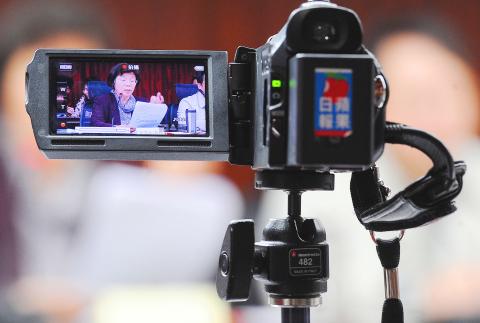Academics and representatives of various non-governmental organizations (NGOs) yesterday voiced their worries about the buyout of Next Media Group’s (壹傳媒集團) Taiwanese operations, urging the Fair Trade Commission (FTC) to consider the importance of having diverse voices in the media when reviewing the deal.
At a public hearing organized by the commission yesterday, former FTC commissioner Shih Jun-ji (施俊吉) said the review of the Next Media buyout is the most important case in the commission’s history.
Shih said the commission should spare no effort to prevent buyers from circumventing the law, adding that the Fair Trade Act (公平交易法) stipulates that the commission should not only take into consideration the benefit to the economy as a whole, but also the public interest.

Photo: Chu Pei-hsiung, Taipei Times
In terms of the public interest, the government should create an environment that allows newspapers to produce materials from as many perspectives as possible, while the accuracy of news is also of vital importance, he said.
There is no economic benefit for society from the deal, while the disadvantages that will result from it are that the public will only be given limited perspectives on events in the future, Shih said, adding that there is no reason for the commission to approve the deal.
Association of Taiwan Journalists (ATJ) president Chen Hsiao-yi (陳曉宜) emphasized the unique nature of the media as a means for the public to obtain information. She demanded that the FTC’s commissioners review the case differently from other cases.
Chen said the print media have agenda-setting power for the entire media industry and have often dictated what news is broadcast on local TV stations the following day.
Therefore, because of the influence print media have, it is not sufficient for the commission to make a decision based on market share alone, she said.
Citing a survey conducted by AC Nielsen, Jang Show-ling (鄭秀玲), a professor of economics at National Taiwan University, said Want Want China Times Group’s (旺旺中時集團) share of Taiwan’s media market would exceed 50 percent after the buyout deal goes through.
As Want Want Group has a record of using its media outlets to attack its critics or those who stand in its way, Jang said the disadvantages resulting from the Next Media deal are too significant to be ignored.
Jang became emotional when she said that she had to stay alert on the street because of her involvement in the case.
FTC spokesman Sun Lih-chyun (孫立群) said that the commission would try to incorporate the importance of diverse voices on the media into their review process.
Sun said the information the commission has now suggests that there are two groups of buyers and two contracts. One is related to Next Media’s print media and the other to its electronic media.
The commission has yet to receive a formal submission of the deal, he said.

DAREDEVIL: Honnold said it had always been a dream of his to climb Taipei 101, while a Netflix producer said the skyscraper was ‘a real icon of this country’ US climber Alex Honnold yesterday took on Taiwan’s tallest building, becoming the first person to scale Taipei 101 without a rope, harness or safety net. Hundreds of spectators gathered at the base of the 101-story skyscraper to watch Honnold, 40, embark on his daredevil feat, which was also broadcast live on Netflix. Dressed in a red T-shirt and yellow custom-made climbing shoes, Honnold swiftly moved up the southeast face of the glass and steel building. At one point, he stepped onto a platform midway up to wave down at fans and onlookers who were taking photos. People watching from inside

A Vietnamese migrant worker yesterday won NT$12 million (US$379,627) on a Lunar New Year scratch card in Kaohsiung as part of Taiwan Lottery Co’s (台灣彩券) “NT$12 Million Grand Fortune” (1200萬大吉利) game. The man was the first top-prize winner of the new game launched on Jan. 6 to mark the Lunar New Year. Three Vietnamese migrant workers visited a Taiwan Lottery shop on Xinyue Street in Kaohsiung’s Gangshan District (崗山), a store representative said. The player bought multiple tickets and, after winning nothing, held the final lottery ticket in one hand and rubbed the store’s statue of the Maitreya Buddha’s belly with the other,

‘NATO-PLUS’: ‘Our strategic partners in the Indo-Pacific are facing increasing aggression by the Chinese Communist Party,’ US Representative Rob Wittman said The US House of Representatives on Monday released its version of the Consolidated Appropriations Act, which includes US$1.15 billion to support security cooperation with Taiwan. The omnibus act, covering US$1.2 trillion of spending, allocates US$1 billion for the Taiwan Security Cooperation Initiative, as well as US$150 million for the replacement of defense articles and reimbursement of defense services provided to Taiwan. The fund allocations were based on the US National Defense Authorization Act for fiscal 2026 that was passed by the US Congress last month and authorized up to US$1 billion to the US Defense Security Cooperation Agency in support of the

‘COMMITTED TO DETERRENCE’: Washington would stand by its allies, but it can only help as much as countries help themselves, Raymond Greene said The US is committed to deterrence in the first island chain, but it should not bear the burden alone, as “freedom is not free,” American Institute in Taiwan Director Raymond Greene said in a speech at the Institute for National Defense and Security Research’s “Strengthening Resilience: Defense as the Engine of Development” seminar in Taipei yesterday. In the speech, titled “Investing Together and a Secure and Prosperous Future,” Greene highlighted the contributions of US President Donald Trump’s administration to Taiwan’s defense efforts, including the establishment of supply chains for drones and autonomous systems, offers of security assistance and the expansion of